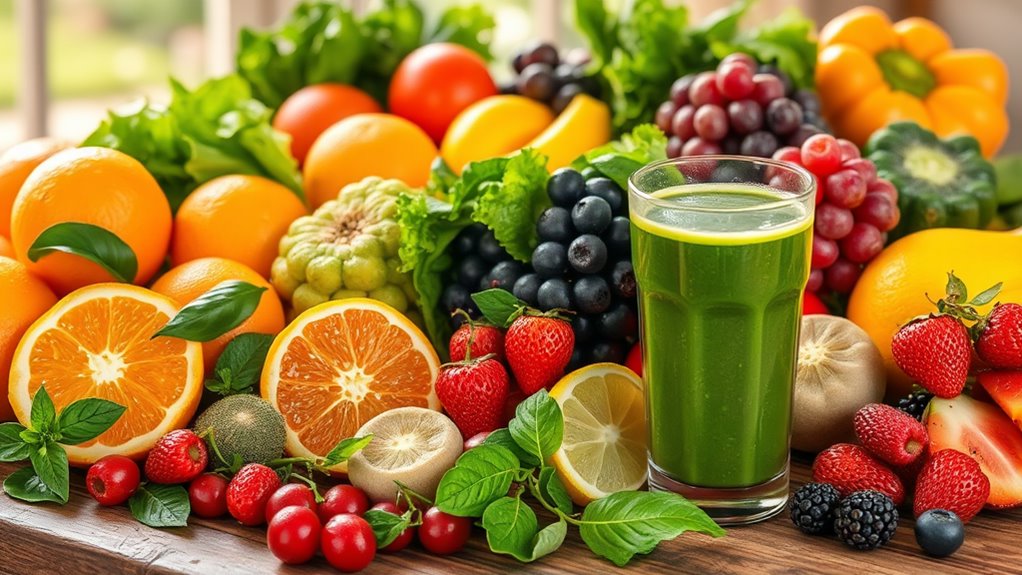How to Eat Your Way to a Cleaner, Happier Body
To eat your way to a cleaner, happier body, fill your plate with a variety of fruits and veggies for detoxification. Whole grains help manage blood sugar and reduce diabetes risk, while healthy fats boost your mood and cognitive function. Don’t forget those essential nutrients like B vitamins and vitamin D—they’re crucial for mental wellbeing. Incorporating mindful eating habits can enhance your experience. Stay tuned for more tips on building a healthier lifestyle!
Key Takeaways
- Incorporate a variety of fruits and vegetables, especially citrus and dark leafy greens, to enhance detoxification and support liver health.
- Choose whole grains like oats and buckwheat to manage blood sugar levels and reduce the risk of type 2 diabetes.
- Include healthy fats from sources like fatty fish, avocados, and nuts to improve mood and cognitive function.
- Ensure adequate intake of B vitamins, vitamin D, magnesium, and zinc to support mental wellbeing and reduce depression.
- Practice mindful eating by checking hunger levels, using smaller plates, and savoring each bite for a more satisfying experience.
The Power of Fruits and Vegetables for Detoxification
When you incorporate a variety of fruits and vegetables into your diet, you’re not just enjoying delicious flavors; you’re also giving your body powerful tools for detoxification. These foods help you detox through food by providing essential vitamins and minerals. For instance, citrus fruits, like oranges and grapefruit, are rich in vitamin C, boosting your immune system and liver function. Additionally, these fruits contain high pectin levels, which aid in toxin elimination. Incorporating cleansing foods into your meals can further enhance liver health and support overall detoxification.
Dark leafy greens and cruciferous vegetables, such as broccoli, enhance liver detox with their high chlorophyll content and sulfur compounds. Don’t forget about antioxidant-rich fruits like blueberries and red grapes, which neutralize free radicals and support gut health.
Whole Grains: Your Ally in Managing Blood Sugar
Incorporating whole grains into your diet can be a game changer for managing blood sugar levels. Whole grains like oats and buckwheat are rich in dietary fiber, helping regulate blood sugar and improve glycemic control. Consuming 60 to 90 grams daily can cut your risk of developing type 2 diabetes by up to 32%. Opt for less-processed grains, as they’ve been shown to reduce fasting glucose and glycemic variability. Studies have demonstrated that higher whole grain intake is associated with improved glycemic control. Additionally, being aware of nutritional deficiencies can help you identify if you’re missing out on vital nutrients that support overall health. Mixing different types of whole grains can enhance these benefits. By swapping refined grains for whole grains, you’ll not only support better blood sugar management but also promote weight control.
The Role of Healthy Fats in Mood Enhancement
Healthy fats play an essential role in enhancing your mood and overall mental wellbeing. Incorporating these fats into your diet can lead to significant mood benefits.
Here are a few reasons why you should focus on healthy fats:
-
Omega-3 Fatty Acids: Found in fatty fish, they’re linked to reduced depression and improved mood. These fats are also known to boost brain health, which can further enhance cognitive performance.
-
Monounsaturated Fats: Present in foods like olive oil and avocados, they may support mood enhancement. Moreover, these fats are essential for the absorption of fat-soluble vitamins A, D, E, and K, which are crucial for mental health.
-
Balanced Intake: A mix of fats from various sources, including nuts and seeds, is vital for ideal mental health.
Nutrients Essential for Mental Wellbeing
To maintain a positive mental state, it’s essential to focus on the nutrients that support your brain health. B vitamins, like folate and B12, are important; their deficiencies can lead to depression. Incorporate whole grains, leafy greens, and lean meats to boost your B vitamin intake. Additionally, supplemental B vitamins can enhance the effects of antidepressants, further promoting mental wellness. Research indicates that the synergistic effects of these nutrients can collectively improve energy levels, which in turn positively influences mental health.
Vitamin D also plays a key role; it’s linked to mood regulation, so get sunlight and include oily fish in your diet. Amino acids, particularly tryptophan, help synthesize serotonin, necessary for mood stability.
Don’t forget minerals like magnesium and zinc, which support brain function and stress response—find them in nuts, seeds, and red meat. Finally, omega-3 fatty acids from fish and seeds are essential for cognitive health and mood regulation.
Practical Tips for Mindful and Balanced Eating
Although eating can often feel like a mindless routine, practicing mindful and balanced eating transforms it into a rewarding experience.
Here are some practical tips to help you cultivate this habit:
-
Ask Before Eating: Check in with your hunger and thirst levels.
-
Smaller Portions: Use smaller plates to control serving sizes. This practice not only helps in portion control but also enhances mindful eating, allowing you to savor each bite. Additionally, incorporating simple nutrition tweaks can lead to more nutritious choices in your meals.
-
Mindful Meals Schedule: Stick to regular meal times to stabilize hunger cues.
Frequently Asked Questions
How Can I Effectively Meal Prep for a Balanced Diet?
Imagine your kitchen as a canvas. To effectively meal prep for a balanced diet, set clear goals, create organized grocery lists, batch cook, and embrace variety. You’ll paint a healthier, vibrant picture of your meals.
What Are Some Easy Ways to Increase My Daily Vegetable Intake?
To easily increase your daily vegetable intake, start adding veggies to breakfast, create colorful salads, sneak them into sandwiches, and snack on raw options. Experiment with different cooking methods for added flavor and variety.
How Do Food Labels Help in Making Healthier Choices?
You know what they say: “Knowledge is power.” Food labels give you essential info, helping you identify healthier choices, manage portions, and make informed decisions about what you’re eating for a balanced, nutritious diet.
Can I Eat Snacks While Maintaining a Clean Diet?
Yes, you can eat snacks while maintaining a clean diet. Just choose nutrient-dense options like fruits, veggies, and whole grains, and keep portions in check to support your health goals without sacrificing satisfaction.
What Are the Best Sources of Plant-Based Protein?
To boost your plant-based protein intake, incorporate hemp seeds, lentils, and tempeh into your meals. Don’t forget quinoa and chickpeas for variety. These options will help you meet your protein needs deliciously and healthily!
References
- https://newsinhealth.nih.gov/2017/05/how-your-eating-habits-affect-your-health
- https://www.aupress.ca/app/uploads/OER-202302_Chamberlain_Dubberlboer_2023-Read-Think-Write.pdf
- https://www.nhsinform.scot/healthy-living/food-and-nutrition/eating-well/health-benefits-of-eating-well/
- https://www.tmu.ac.in/other_websites/cdoe.tmu.ac.in.old/study-material/28-08-2024/COMMON/SEMESTER_3/MAIN_COMMUNICATION_FOR_LEADERS.pdf
- https://www.uab.edu/inquiro/issues/past-issues/volume-9/the-effects-of-an-american-diet-on-health
- https://www.smartypantsvitamins.com/blogs/articles/foods-that-detox
- https://www.healthline.com/nutrition/how-to-detox-your-body
- https://drcindyjakubiec.com/the-10-best-foods-for-detox-recipes-for-each/
- https://www.liveremedy.com/deep-detox-cleanse-with-fruit/
- https://www.canyonranch.com/well-stated/post/our-top-9-detoxifying-foods

